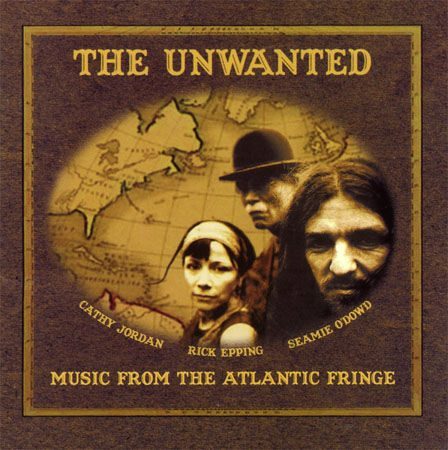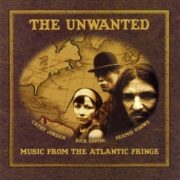THE UNWANTED – SONGS FROM THE ATLANTIC FRINGE
ARTIST: THE UNWANTED
TITLE: SONGS FROM THE ATLANTIC FRINGE
LABEL: COMPASS RECORDS
RELEASE: 2009
 At any given acoustic jam that might include musicians of old time, Celtic, Appalachian, or any other form that serves up songs of a traditional disposition, you might hear a certain similarity between old ballads, folk blues, lullabies, and church music. There might be a twist in the lyrics that bends an old Irish lament into something akin to an American blues tune or a harmonica melody might remind you of some doleful dirge from a concertina heard in a nameless pub you fell into one night.
At any given acoustic jam that might include musicians of old time, Celtic, Appalachian, or any other form that serves up songs of a traditional disposition, you might hear a certain similarity between old ballads, folk blues, lullabies, and church music. There might be a twist in the lyrics that bends an old Irish lament into something akin to an American blues tune or a harmonica melody might remind you of some doleful dirge from a concertina heard in a nameless pub you fell into one night.
Songs from the Atlantic Fringe, a collaborative effort from three musicians, collectively known as The Unwanted, calls attention to this common ground where music has infiltrated one continent and then returned, altered here and there, often colored with regional lyrics or instrumentation. This long history of exchange between the Old World and the New is not necessarily a revelation, but in this 13-track compilation, the approach is flavored with an Old World reverence and the crackle of the New World. The band can lean one way or the other on any given song or even combine a reel with a Leadbelly song such as the compelling opening track, Out on the Western Plains. A rousing welcome to the New World, indeed!
Rick Epping has traveled back and forth between his native California and Ireland for a good part of his life, spending some years with American band, Pumpkinhead (check out this amazing YouTube from 1976), which called Sligo its home base. He brings to life a jaunty, The Morning Blues, sounding like one who has experienced this phenomenon a few times and then some. His harmonica playing is a treasure in itself, revealed here and throughout the recording. It’s no mean feat for a mouth harpist to keep up with any number of Irish jigs and reels. This song also gets a spirited Jordan playfully singing backup vocals like she’s kicking her heels on the front porch. Epping stretches out on harmonica on the slip jig, An Phis Fliuch, where a concertina or accordion might ordinarily have taken the solos. Angelina Baker, gets your attention with words by Stephen Foster and sung by Epping, but also from some O’Dowd fiddling which might hint at a few Irish tunes that came before and after.
And that fiddling gets a little more room and continental blend as the following song, Shove the Pig’s Foot a Little Further in the Fire rolls then reels into Greenfields of America. Seamie O’Dowd is found in voice or with any number of instruments throughout this album. A warm assured vocal in Turn the Corner makes this ode to the natural beauty of hometown Sligo, near poetry as the simple melody is enriched by some Epping harmonica turns. The Jagger-Richards lament, No Expectations, is not that far-fetched here or dubious as a folk song since the original had its own acoustic country blues treatment. Instead of the Brian Jones slide guitar, O’Dowd’s dobro picks up the sad wail behind Epping’s reading of the down-on-his-luck testament.
Cathy Jordan, taking a break from Irish super-group, Dervish, contributes several song choices and lead vocals. And although she was voted in the top ten most distinctive voices in Ireland by a radio listener poll, she often alters her singing here to give each song a sound that fits the period or the place. She sings it as if the Civil War had just ended in Sweet Becky at the Loom, and contemporary folk tune, It’s Cool to be Green renders a motherly modern lullaby. Eileen a Ruin, sung for the most part in a capella, switches back and forth from Gaelic to English. Jordan’s lovely voice caresses this tune and is a perfect ending to the collection.
This is a must-have for both Americana folk music listeners as well as those Celtic fans familiar with the Dervish songbook, and open to exploring the roots that have grown between the two countries across the pond.
Joel Okida is a struggling artist, struggling writer, and struggling musician. It occurs to him that life is all about the struggle. Fortunately, he did not take up acting. However, he’s not half-bad as a zydeco dancer and the ability to make a mean gumbo and lovely walnut tortes has gotten him by.
Â
Â













